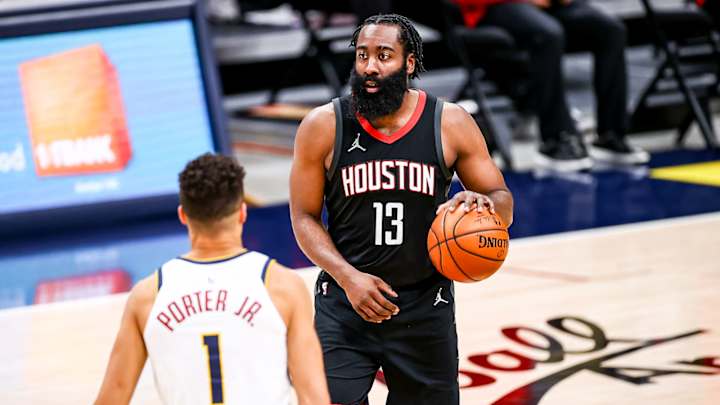Rockets Hit Reset Button in James Harden Trade

After two months of trade rumors, unexplained absences and questionable effort, the James Harden era ended on Wednesday afternoon. The Rockets ripped off the Band-Aid less than 24 hours after Harden reinforced his trade demand in a press conference walk-off, shipping the former MVP to Brooklyn to end a highly successful eight-year stretch in Houston.
Dealing Harden was no easy task. He’s been one of the league’s most dominant franchise anchors over the last decade, racking up scoring titles and playoff appearances with a host of uneven supporting casts. Even as the situation appeared increasingly untenable, Houston held firm through the start of the season. It’s nearly impossible to get full value back for a player of Harden’s caliber. Misfiring on the return package for Harden will sink the franchise for the next decade, squandering a trade asset rivaling Anthony Davis.
So how did first-year general manager Rafael Stone fair in Wednesday’s blockbuster deal? Let’s assess Houston’s plate of returning assets.
The Rockets’ potential paths to a Harden trade became increasingly clear in recent weeks. A deal with Brooklyn would land Houston unmatched pick capital compared to other options, allowing Stone and head coach Stephen Silas to mold the franchise in their image. Yet it wasn't just a diet of draft picks that piqued Houston's interest. Other suitors quickly lined up as Harden's departure became increasingly likely.
The Raptors, Celtics and Heat each dipped their toe into the trade waters with packages centering around established pieces, and the 76ers reportedly dangled All-Star guard Ben Simmons. Landing a player of his caliber was certainly tantalizing, but barring the attachment of significant pick capital, a Harden-for-Simmons swap came with its own drawbacks. Pairing Simmons and John Wall would create a backcourt with minimal outside shooting. The Rockets would still be at a pick disadvantage following the Chris Paul-Russell Westbrook swap, and the avenues for improvement would remain difficult. Perhaps none of Houston’s future draft picks will be as good as Simmons in a vacuum, but the flexibility provided by the Nets' offer proved paramount.
Houston acquired three unprotected Nets first-round picks in Wednesday’s deal, as well as the Bucks’ 2022 first-rounder. The Rockets also have the right to swap first-round picks with Brooklyn in 2021, 2023, 2025 and 2027, potentially setting the stage for a deluge of young talent in the second half of the 2020s. The combination of four first-round picks and four pick swaps is no joke. Houston received more pick capital than the Pelicans did for Anthony Davis, and their trade partner isn’t exactly guaranteed long-term success with a trio of mercurial personalities. If seeking draft capital was the Rockets’ top priority, Wednesday’s trade represents a marked success.
The hoard of future draft picks aren’t the only pieces coming to Houston after shipping Harden. The Rockets also acquired Pacers guard Victor Oladipo on Wednesday, sending former Nets guard Caris LeVert to Indiana in the deal. Trading for Oladipo is sensible on a number of fronts. From a pure basketball standpoint, Oladipo should be an effective two-way piece for Silas in the backcourt, providing additional scoring punch and a strong defensive partner for Wall. Oladipo has found his All-Star form early on in 2020–21 after missing much of last year due to injury, and he could very well keep Houston from sinking fully into the Western Conference cellar. Oladipo is just 28. He could serve as a valuable bridge to the next era if the Rockets look to make a long-term commitment.
Oladipo’s contract situation should also benefit Houston. The Rockets have just three players slated to earn over $12 million in 2021–22, with Wall standing as the lone player owed more than $20 million. If Houston wants to sign Oladipo to a long-term deal in this summer’s free agency, they should have plenty of flexibility to do so. But the more likely path involves yet another deal. The Rockets could continue to commit to the tear-down model, shipping Oladipo before March’s trade deadline. If Houston can also find a taker for Eric Gordon’s contract, its cap commitments drop considerably. Stripping this roster and amassing pick capital isn’t the sexiest option, but considering the roster as currently constructed, it may be Houston’s best chance at regaining relevance. After chasing the championship for the last half-decade, a youth movement could be on the way sooner than later.
Dealing a player of Harden’s caliber isn’t an easy pill to swallow for an organization. Houston had a walking playoff berth on its roster for eight years, one who at his best was among the greatest offensive players in league history. Harden’s scoring brilliance is unmatched. His competitive fire was a near-constant. Regardless of the draft capital amassed, Wednesday remains a sad day for the franchise.
It’s ultimately for the best that the Rockets decided to act on a Harden trade sooner than later. If Daryl Morey and Mike D’Antoni’s departures signaled the end of an era, Harden’s exit marked a confirmation. Houston can now fully turn the page with Harden in Brooklyn, eyeing a new path to success in the coming seasons.
Silas is well-regarded throughout the league as a skilled tactician. He’s recently proved to be a true leader. Silas and Stone create a quality brain trust, and John Wall should serve as an effective face of the franchise. There may be a current talent deficiency in Houston, but the path toward sustainable development is now clear. If the Rockets manage the coming years correctly, trading Harden could be the start of a satisfying new chapter.
More on Harden blockbuster

Michael Shapiro is a staff writer for Sports Illustrated. He is a Denver native and 2018 graduate of The University of Texas at Austin.